Straits and Maritime Channels: A Reflection
Roberto Natali - November 7, 2021
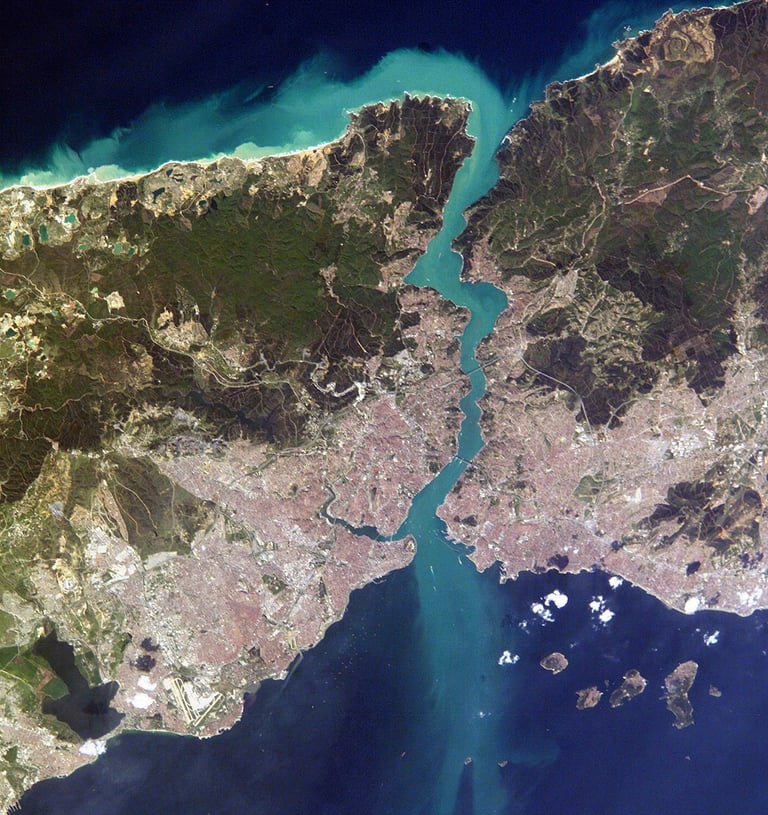

* The cover image of this paper was taken from the Wikipedia website, in the “satellite photos” section, available at the following link: https://it.m.wikipedia.org/wiki/File:2004_satellite_picture_of_Istanbul_and_the_Bosphorus.jpg.
As many will remember, in December 1989 the United States invaded Panama, with the declared and successful aim of deposing General Manuel Noriega, head of the Armed Forces who exercised de facto dictatorial power in the country. It was a military operation, decided by President George H. W. Bush, called “Just Cause” that for a long time blocked commercial traffic in the Panama Canal, whose administration was returned to the Panamanians after 10 years, on the basis of the Carter-Torrijos agreement of December 1999.
Beyond the political effects usually associated with military operations, the blockade of the Panama Canal did not fail to produce very serious damage to the economies of many countries, especially on the Pacific coast of South America, which used the Central American route to export their products, through Panama, or import them from the European and African continents. We must not forget, in fact, that despite the advancement of technologies and cargo air carriers, even today about 80% of world trade uses ships as a means of transport. Therefore, straits and maritime canals "shorten the distances of the world" and constitute strategic passages of absolute importance for world trade, assuming extreme importance in terms of geopolitics and international security, as well as in the balance of power between States and in the delicate diplomatic dossiers that concern them. On the other hand, the recent incident in the Suez Canal, in which the grounding of the motor vessel "Ever Given" caused the total blockage of the passage of vessels for over a week, causing losses to shipping companies for millions of dollars, also bears witness to this delicate aspect.
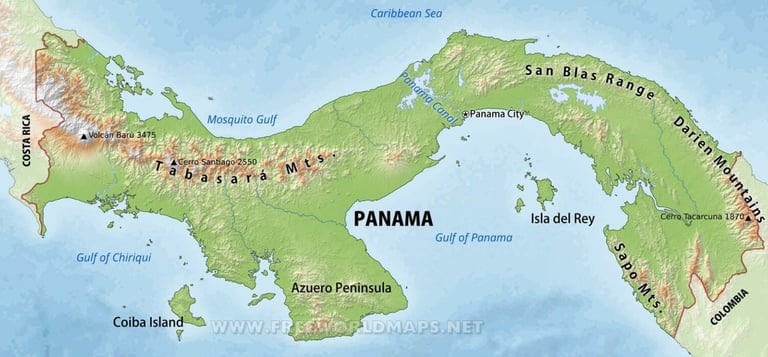

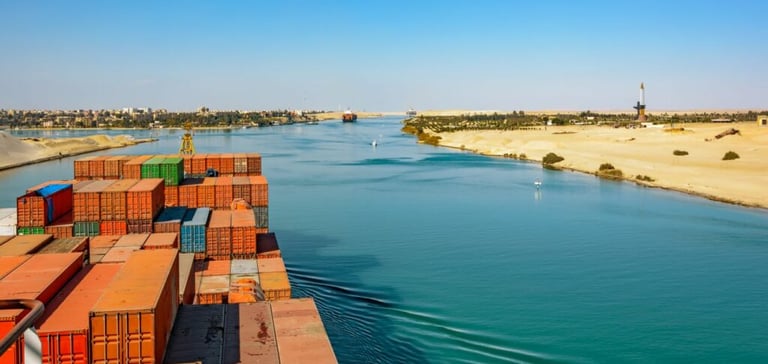

Fig. 1: Il Canale di Panama sulla cartina geografica https://www.freeworldmaps.net/centralamerica/panama/map.html
Fig. 2: Visione del Canale di Suez a bordo di una porta-container
https://stock.adobe.com/it/search?k=%22suez+canal%22
Let's take the case of Ecuador, an Andean country that in 1989 was among the world's leading exporters of bananas, cocoa, shrimp, and was part of OPEC, the Organization of the Petroleum Exporting Countries. In its capital, Quito, located 3,000 meters above sea level, serious economic damage was evidently recorded caused to the country by the Panamanian blockade. Apart from a significant quantity of products that were exported to the USA and Canada following the Pacific coast, the temporary ban on passage through Panama forced the cargo ships of the Andean nation to circumnavigate the South American continent to access the Atlantic through the Strait of Magellan. A similar fate was reserved for other countries on the Pacific coast in relation to their exports to Europe, with greater damage to the naval transport of perishable goods such as, for example, tropical fruit and other foodstuffs, but still with significantly higher costs also for the transport of industrial, mineral or hydrocarbon products.
Regardless of the aforementioned case of Panama, it is more than evident that the need to ensure the smooth passage of maritime transport through straits and canals, as obligatory routes, concerns many other fundamental strategic passages of great importance in the geopolitical scenario. Among these, the Strait of Hormuz, the Suez Canal, the Strait of Gibraltar, the Bosphorus and the Dardanelles, the Strait of Malacca, Bab El Mandeb and the Bering Strait. If, as we have seen, the Panama Canal - which connects the Atlantic and Pacific oceans - represents a vital element for a large part of the countries of Latin America and the Caribbean, the Strait of Hormuz, located between Iran and Oman, also assumes absolute importance. It is in fact considered the most important oil transit point, with approximately 18 million barrels per day in 2020 (20.7 in 2018 and 20.6 in 2016) and, according to an estimate by the U.S Energy Information Administration, this volume would constitute approximately 20% of the world's liquid oil consumption. At the same time, it is worth underlining the importance of the Strait of Malacca, the main passage between the Pacific Ocean and the Indian Ocean, which is placed, in terms of commercial traffic, immediately behind Hormuz.
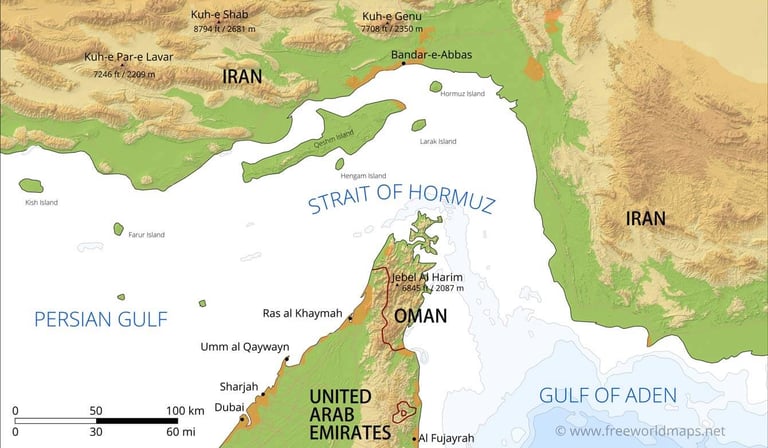

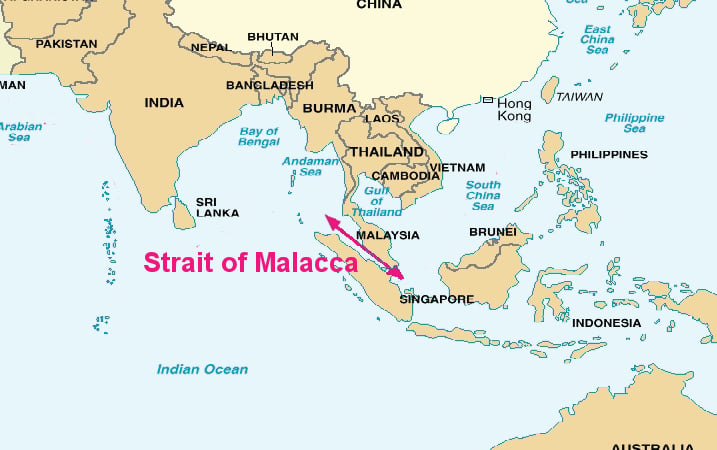

Fig. 3: Stretto di Hormuz
https://www.adventureiran.com/hormuz-island/
As for the aforementioned issue of the Suez blockade - an artificial passage of about 200 kilometers that connects the Red Sea to the Mediterranean - in addition to the economic repercussions on naval trade between Europe and the ports of East Africa, Asia and Oceania, it is worth remembering the aforementioned case of the Ever Given container ship (belonging to the Taiwanese company Evergreen and flying the Panamanian flag). This issue has not failed to produce its distorting effects also on the Ba Bel-Mandeb Strait, through which the Suez Canal is accessed and which constitutes an essential strategic point between the Indian Ocean and the Red Sea.
But also the historical, political and economic importance of the Strait of Gibraltar is, especially for us Europeans, very evident since, with its length of 64 kilometers, it represents an obligatory passage between the Mediterranean Sea and the Atlantic Ocean and a sensitive border between Europe and Africa. This is in fact a significant critical point in the delicate issue of migratory waves from the Maghreb and sub-Saharan regions. On the other hand, the persistent presence of the United Kingdom on the Strait through the Rock of Gibraltar and that of Spain in African territory, with the enclaves of Ceuta and Melilla, are clear evidence of its strategic value.
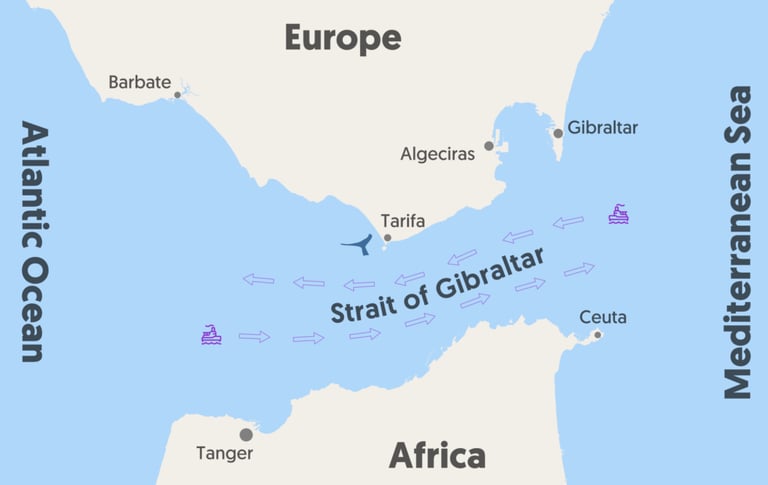

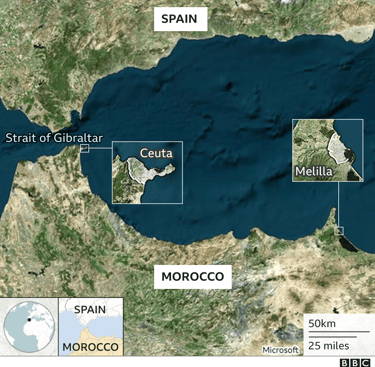

Fig. 5: Stretto di Gibilterra
https://iilss.net/tag/strait-of-gibraltar-upsc/
Fig. 6: Enclavi di Ceuta e Melilla
https://www.bbc.com/news/world-africa-57305882
Furthermore, the Bosphorus and the Dardanelles, straits that divide Asia from Europe, easily show their decisive strategic importance, even more so in coincidence with a newfound power of Ankara in the Mediterranean and Middle Eastern region. The Bosphorus, located between the Black Sea and the Sea of Marmara, and the Dardanelles, located between the Sea of Marmara and the Aegean and Mediterranean seas, are therefore waterways and strategic passages in relation to numerous industrial products and raw materials, as well as crude hydrocarbons from the Caspian Sea region and destined for Western and Southern Europe.
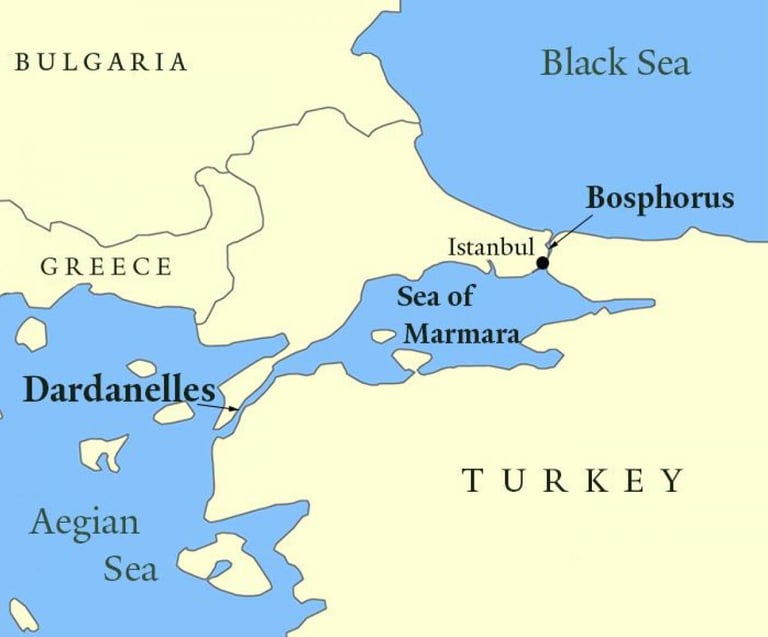

The strategic value of the Bering Strait is clearly evident if we consider that it separates the United States from Russia and for a long time, especially in the most critical phases of the so-called Cold War, was heavily monitored by both the USA and the Soviet Union and gave rise to many frictions and tensions. It is quite common for students of geo-strategy to come across maps that represent unusual perspectives. Among these, a particularly interesting map is one centered on the North Pole, which shows Nordic “oil routes” through Bering, to which both Moscow and Washington have been giving extreme geopolitical attention for many decades.
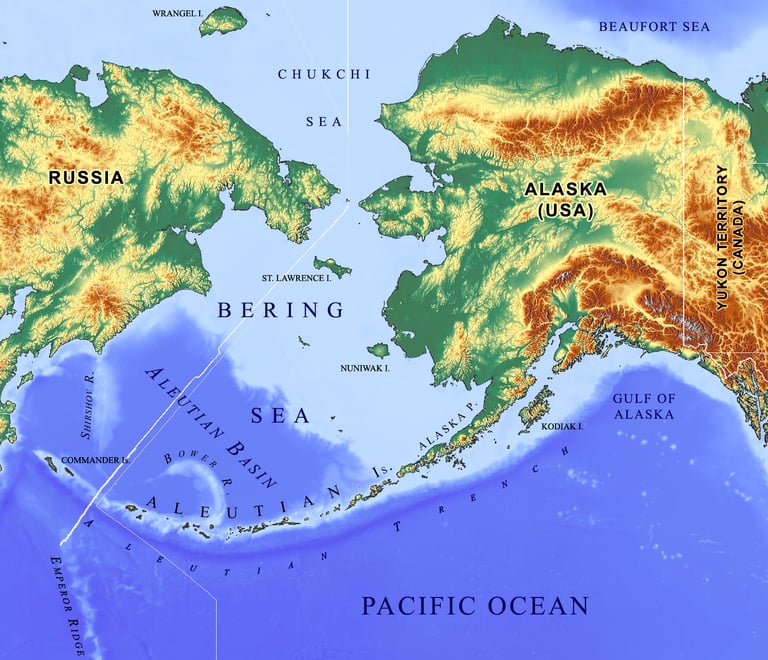

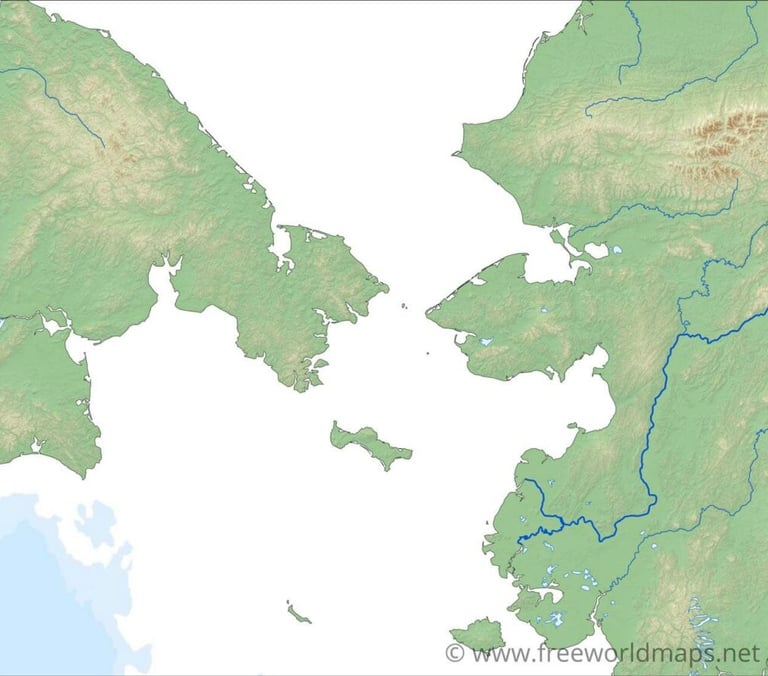

Fig. 8: Stretto di Bering su mappa geografica https://no.m.wikipedia.org/wiki/Fil:Bering_Sea_Aleutian_Is_Alaska_map.png
Fig. 9: Visione aerea dello Stretto di Bering
https://www.freeworldmaps.net/ocean/bering-strait/map.html
The geo-strategic consequences of the lack of free access to channels and straits
It should be noted that the International Community has long been making efforts to codify international law rules relating to maritime passages through conferences and conventions (the Montego Bay Conference on the Law of the Sea in 1982 is essential in this regard). Despite this, the security of the straits can be put at risk by various factors. Among these, frequent episodes of piracy have caused particular echo, which, in addition to constituting a concrete threat to maritime passages, force States and shipowners to equip themselves with deterrent and/or defense devices on board, in order to prevent attacks on their vessels even in the open sea. Particularly serious and well-known is the activity of pirates who, with a high number of attacks, have infested the Strait of Malacca and the Strait of Bab El Mandeb in recent years, in some cases supported by non-state entities and left in a position to act by the almost total lack of controls by coastal states, a deficiency that has undoubtedly favored illegal trafficking and crime.
On the other hand, essential products for the economies of the entire world transit through the straits of the Middle Eastern region, including first and foremost oil. An indiscriminate increase in its price, due to the temporary blocking of a strategic channel, could in fact have repercussions on global prices, with the obvious possibility of generating a generalized economic recession. Let us recall, in this regard, the situation of suffering that arose following the so-called Yom Kippur War in 1973, and the consequent increase in the price of hydrocarbons and related products. Sometimes, even situations of latent political conflict with countries that insist on a strategic maritime passage generate critical issues, because instability increases the fear of insecurity and it is difficult to maintain high levels of efficiency and guaranteed navigability, as demonstrated, for example, by the long tensions between the United States and Iran and the consequent insecurity of the passage to Hormuz, after the dramatic events of 1979 and the long kidnapping of US diplomats in Tehran.
Ultimately, regardless of the cause, the timing of the blockade of a strait is decisive: if it is limited to two or three days, the impact will be limited to a worsening of the delay in the passage of ships. However, if the blockade were to continue, it would produce very serious global ramifications with an increase in prices and huge losses for economic operators. In the recent case of Suez, for example, not only were deliveries of food, fuel, manufactured goods, vehicles and various products blocked, but the Egyptian authorities themselves did not collect the canal passage rights, which some experts have calculated for each vessel - for the entire period of blockage - at around 700,000 dollars! We know, therefore, that these maritime passages - of enormous importance for the world economy - present risks of blockage capable of destabilizing the shipping system, generating significant losses for shipowners, canal management companies and States. This can be caused by fortuitous accidents (e.g. Suez 2021), war events in the region (e.g. Yom Kippur 1973), political-military interventions (e.g. Panama 1989), but also by episodes of piracy, terrorist attacks, peculiar conditions that temporarily prevent the use of transit systems (e.g. damage to the lock mechanisms).
The problem of the sensitivity of strategic maritime passages is deeply felt by scholars of international law and by world diplomacy. These, although aware of the balance of power existing between the actors of the International Community, have not failed to theorize forms of internationalization of some straits and canals, with the aim of removing them from the political control of individual States and making the risk of blockage for political reasons less likely. This solution would be of undeniable convenience both for the country that hosts the canal in its territory, and for the shipping companies and for the entire International Community. In fact, an adequate formula of internationalization would perhaps represent the most suitable legal form in terms of neutrality, efficiency and peaceful use of the strategic passage. Furthermore, its administration, in the event of war, could be entrusted to a special commission above the parties, capable of guaranteeing the regular performance of the passage operations of ships, preventing international trade and transport from suffering from instability. However, it is easy to understand that the interests at stake would still be numerous and significant; Furthermore, the concrete realization of such a project would be only partially
Abaqua
Via Cassia, 615
00189 Roma (RM)
© 2024. All rights reserved.
Codice Fiscale: 96584590580


